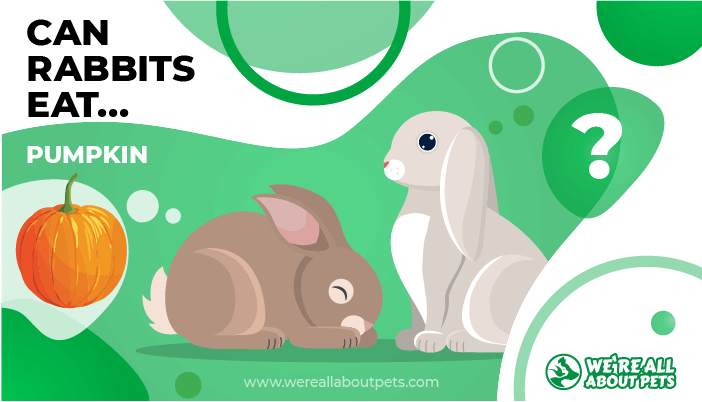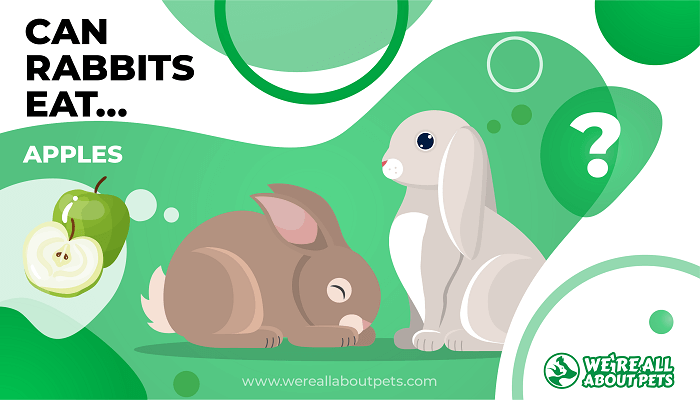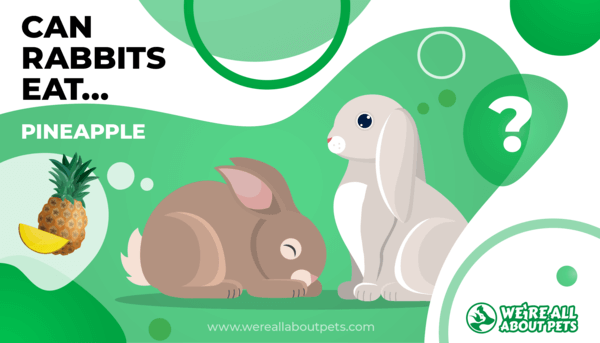Can Rabbits Eat Basil?
This page contains affiliate links. We may earn money or products from the companies mentioned in this post through our independently chosen links, which earn us a commission. Learn More
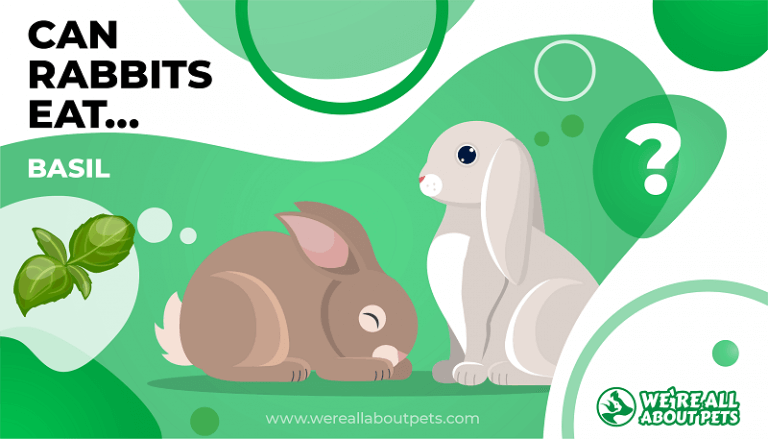
It’s an essential ingredient in pesto and other Italian recipes – and it makes its way into many other cuisines worldwide.
Basil is good for us – but is this delicious herb safe for our pets?
In case you looking for a quick answer, it’s yes! Rabbits can have basil. Before you run to the farmers market or hop out to the garden, there are some important things you should know.
Keep on reading and in just a moment you’ll know everything there is to know about basil for rabbits.
Basil Nutrition Stats
Basil offers tons of flavor without contributing many calories to your daily intake.
A generous ¼ cup serving of fresh basil leaves gives you about:
- 5 calories
- .6 g carbohydrates
- .1 g fiber
- .2 g protein
- 0 g fat
Basil Nutritional Facts
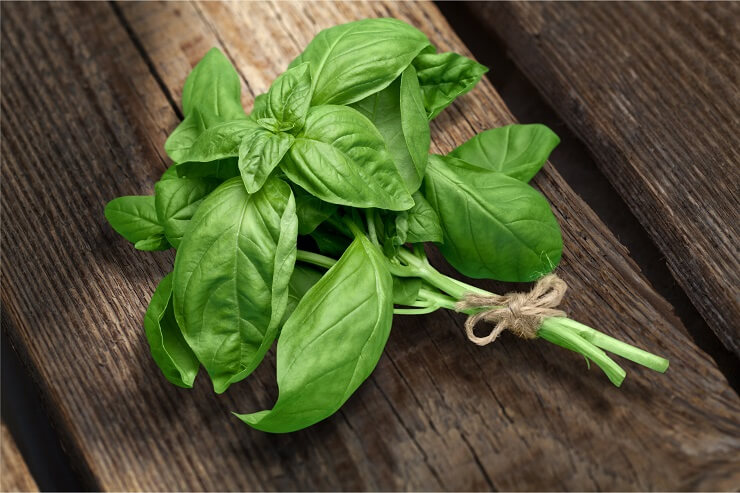
Basil is high in vitamin A, which is something you and your rabbit need. That same delightful ¼ cup serving of basil leaves offers approximately:
- 317 iu vitamin A
- 9 mcg vitamin K
- 1 mg vitamin C
- 1 mcg folate
- 8 mg magnesium
- 6 mg calcium
- 7 mg potassium
Can Rabbits Have Basil?
Yes! Rabbits can have basil – but you’ll need to be careful to offer the right amount and to give your rabbit basil on a rotating basis with other fresh foods.
If your rabbit is prone to urinary sludge or kidney stones, then you may just want to offer a timetable of basil rather than a full serving since this herb is fairly high in calcium.
Is Basil Good For Rabbits?
Absolutely! Basil is nutritious and low in sugar, so it is a nice, natural treat for rabbits so long as they are in good health with no existing urinary tract or kidney problems.
Of course, you’ll want to stick with the proper amount and you’ll definitely want to give your bunny’s basil a good washing up before bringing it to their hutch.
Do Rabbits Like Basil?

Some rabbits are a little bit sensitive to basil’s scent but most bunnies like this fresh herb. The best way to tell if your rabbit likes basil is to offer a leaf or two and see how they respond.
How Much Basil Can A Rabbit Eat?
Once you have given your bunny a taste of basil and determined that this is a treat they appreciate, you can offer them a bit more. Here’s how much basil to feed your rabbit:
| Age | Amount |
| Baby rabbits | None |
| Juvenile rabbits | None |
| Adult rabbits | 2 stems of basil with leaves |
If your rabbit is already acquainted with fresh food, you can offer them about half of the recommended amount. In case this is their first time eating fresh greens, you’ll want to offer just a leaf or two.
Just like every other time you introduce a new food, you’ll want to monitor your Bunny after the basil for the first time. Watch for signs of discomfort, diarrhea, and bloating.
Basil isn’t likely to cause any issues – in fact, it can sometimes help rabbits with digestive discomfort. Still, it’s really important to keep an eye on your bunny rabbit until you’re sure that they tolerate fresh basil.
So long as everything goes smoothly, you can gradually increase your rabbits basil serving size until they’re eating the full amount.
How Often Can A Rabbit Eat Basil?
Your rabbit can eat basil twice a week or so once they have become accustomed to it. If you’re offering them other foods that are high in calcium, then you may want to cut back on the amount of basil in your rabbit’s diet.
The Correct Diet Is Important
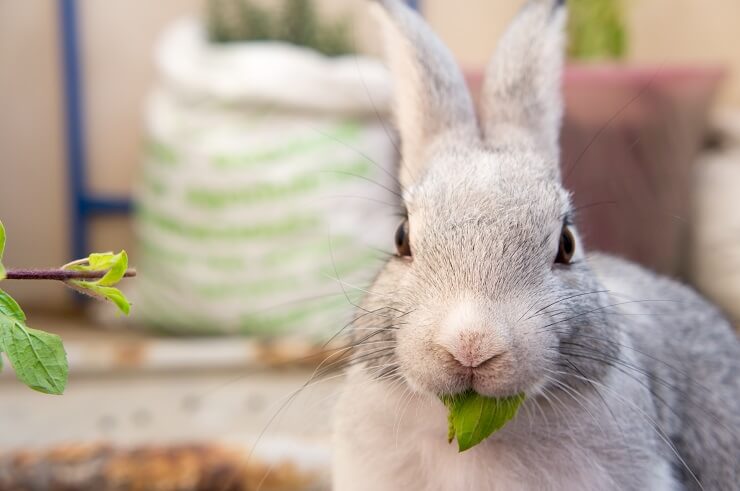
If you’re brand new to the wonderful world of bunny parenting, you might be curious about what a rabbit’s natural diet looks like.
Wild rabbits eat a wide variety of foods. These might not seem exciting to us but they’re essential for the rabbits’ good health.
All of the foods that make up a rabbit’s natural diet are within easy reach. Think grasses on small leafy plants and you’ll be on the right track. We are pretty sure that if a rabbit encountered basil in the wild they’d happily munch away.
Even though it might be tempting to give your rabbit lots of treats, it’s important to keep their diet as close to what mother nature intended as you possibly can.
Here’s what to feed your rabbit:
- Fresh hay is the cornerstone of every rabbit’s diet, with Timothy, oat, and orchard being top choices. Give your bunny an unlimited amount of hay, which they’ll nibble constantly as a means of keeping their digestive tract moving. Remember to remove old, soiled hay frequently to help keep your rabbit’s bedding clean and dry.
- Offer a serving of high-quality rabbit food every day. Check the label to see how much to feed your bunny based on their weight and age.
- Your rabbit can have about one cup of leafy greens plus a tablespoon of crunchy veggies per two pounds of bunny body weight every day. You can give this to them all at once or break it up into separate meals and treats.
- You can give your bunny up to 1 teaspoon of fruit per 2 pounds of body weight, if you like. This is just a general guideline since some fruits aren’t suitable for bunnies, and some have different serving sizes. Be sure to research each fruit to make sure it’s OK for your rabbit to eat.
There are two more things your rabbit needs for good health.
- An unlimited supply of clean, fresh water; remember to rinse and refill your rabbit’s water bottle at least once each day.
- ‘Round the clock access to chewable rabbit toys such as apple wood sticks, pieces of unbleached loofah, or chunks of coconut shell. Rabbits teeth never stop growing and chewing is essential as it helps keep your bunny’s teeth at the correct length.
What Are Other Healthy Alternatives To Basil In A Rabbit’s Diet?
Rabbits enjoy a wide variety of herbs, vegetables, and fruits. Next time you’re looking for a fun (and healthy!) treat for your bunny, you might consider trying:
- cilantro
- carrot tops
- swiss chard
- beet greens
- radish tops
- spinach
- arugula
- romaine lettuce
- butter lettuce
- cabbage
- broccoli
- dandelion greens
- blueberry
- strawberry
- apple
- broccolini
- blackberry
- raspberry
- banana
- endive
- escarole
- fennel
- bok choy
- yu choy
- kale
- carrots
- bell peppers
It’s important to change things up often and rotate through different greens and treats.
This helps keep life interesting for your bunny, plus it helps to prevent a compound called oxalate from building up and combining with calcium. Together, these two compounds can lead to complications including kidney stones and bladder sludge.
For now, how about giving your rabbit basil? It’s a healthy treat that most bunnies enjoy – and it’s a great way to make life a little more flavorful!
Frequently Asked Questions
Is basil safe for rabbits?
Yes, Basil is generally safe for rabbits – in fact, it’s a healthy treat that they can have once or twice per week so long as you offer just a little at a time.
Remember that large amounts of basil might not be ideal for rabbits with a history of kidney or bladder problems since it is high in calcium, which can make matters worse.
Can rabbits eat Thai basil?
Yes, so long as you offer them the correct serving size and remember the importance of introducing it slowly.
Can rabbits have lemon basil?
Yes, rabbits can eat lemon basil, just like other varieties, you’ll want to offer the right amount and provide your pet with a gradual introduction to this tasty herb.
Is sweet basil OK for rabbits?
Yes, it’s perfectly fine to give a rabbit sweet basil. As with all other types of basil, remember to give your bunny the right amount and offer it no more than two times per week.
Can basil make my rabbit sick?
Yes, in rare cases, basil might make your bunny sick. This might happen if your rabbit eats far too much basil all at once, or if they’re new to fresh food and you forget to introduce it slowly.
Over the long term, large amounts of basil can contribute to kidney and bladder problems when your rabbit is eating a diet that is too high in calcium, oxalates, or both. Ask your vet about any concerns – they’re your go-to source for keeping your bunny in great health.






